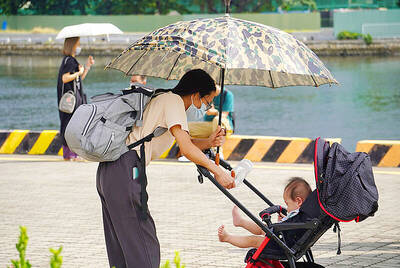The Central Epidemic Command Center (CECC) yesterday released new guidelines that allow people with mild cases of COVID-19 to quarantine at home.
The announcement came after the CECC on Saturday last week said that more than 99 percent of local cases reported this year had mild or no symptoms.
Premier Su Tseng-chang (蘇貞昌) on Sunday announced the “new Taiwan mode” for fighting COVID-19.

Photo: CNA
The government should strike a balance between disease prevention and economic growth, Su said.
Philip Lo (羅一鈞), deputy head of the CECC’s medical response division, yesterday told the center’s daily news conference that people with COVID-19 can quarantine at home if they have mild or no symptoms, are younger than 65, are not pregnant and do not need to undergo dialysis.
Members of a household in which a person is quarantining must also meet the criteria, he added.
The quarantined person must stay in a separate room, while shared showers and toilets must be cleaned thoroughly after each use, he said.
The rules apply to all people listed as domestic cases, including those who tested positive after completing mandatory quarantine after arriving in Taiwan from abroad, he said.
Those listed as imported cases can quarantine at home if they live alone or quarantine together with another infected person in the same household, Lo said, adding that exceptions might be made for people with special care needs.
People living in the same household as a person quarantining at home should be tested three times — 10 days after the case’s initial diagnosis, as well as five and 10 days after the person began quarantining at home, he said.
People who live in a household with four or more others would not be allowed to quarantine at home, Lo added.
Cases can leave home quarantine if they test negative in a home test or a polymerase chain reaction test, he said.
People who test positive 10 or more days after their initial diagnosis may also leave home quarantine if their cycle threshold value is 30 or higher, they have not had a fever for 24 hours and their other symptoms are easing, Lo added.
Upon ending home quarantine, the infected person and anyone living with them must practice self-health management for seven days, with mandatory self-administered rapid tests on the third day and seventh day, he said.
Local governments have the responsibility to notify residents who qualify for home quarantine and monitor their compliance with the quarantine rules, he said.
The mobile phone-based “electronic fence” system would be used to monitor whether people leave their quarantine venue, he added.
Local governments must also work with the central government to establish COVID-19 care service centers, he said.
The centers would be equipped with home test kits for COVID-19 and blood oxygen tests, and offer remote medical consultations, transportation to and from hospitals, and other services, he added.
Household members of people quarantining at home must be ready to immediately seek medical care for the infected person should their condition deteriorate, he said.
When home-quarantined cases have difficulty breathing, chest pain, or their skin, lips or fingernails turn blue, household members should immediately call the 1922 hotline, he said.

DEFENDING DEMOCRACY: Taiwan shares the same values as those that fought in WWII, and nations must unite to halt the expansion of a new authoritarian bloc, Lai said The government yesterday held a commemoration ceremony for Victory in Europe (V-E) Day, joining the rest of the world for the first time to mark the anniversary of the end of World War II in Europe. Taiwan honoring V-E Day signifies “our growing connections with the international community,” President William Lai (賴清德) said at a reception in Taipei on the 80th anniversary of V-E Day. One of the major lessons of World War II is that “authoritarianism and aggression lead only to slaughter, tragedy and greater inequality,” Lai said. Even more importantly, the war also taught people that “those who cherish peace cannot

Taiwanese Olympic badminton men’s doubles gold medalist Wang Chi-lin (王齊麟) and his new partner, Chiu Hsiang-chieh (邱相榤), clinched the men’s doubles title at the Yonex Taipei Open yesterday, becoming the second Taiwanese team to win a title in the tournament. Ranked 19th in the world, the Taiwanese duo defeated Kang Min-hyuk and Ki Dong-ju of South Korea 21-18, 21-15 in a pulsating 43-minute final to clinch their first doubles title after teaming up last year. Wang, the men’s doubles gold medalist at the 2020 and 2024 Olympics, partnered with Chiu in August last year after the retirement of his teammate Lee Yang

The Philippines yesterday criticized a “high-risk” maneuver by a Chinese vessel near the disputed Scarborough Shoal (Huangyan Island, 黃岩島) in a rare incident involving warships from the two navies. The Scarborough Shoal — a triangular chain of reefs and rocks in the contested South China Sea — has been a flash point between the countries since China seized it from the Philippines in 2012. Taiwan also claims the shoal. Monday’s encounter took place approximately 11.8 nautical miles (22km) southeast” of the Scarborough Shoal, the Philippine military said, during ongoing US-Philippine military exercises that Beijing has criticized as destabilizing. “The Chinese frigate BN 554 was

The number of births in Taiwan fell to an all-time monthly low last month, while the population declined for the 16th consecutive month, Ministry of the Interior data released on Friday showed. The number of newborns totaled 8,684, which is 704 births fewer than in March and the lowest monthly figure on record, the ministry said. That is equivalent to roughly one baby born every five minutes and an annual crude birthrate of 4.52 per 1,000 people, the ministry added. Meanwhile, 17,205 deaths were recorded, resulting in a natural population decrease of 8,521, the data showed. More people are also leaving Taiwan, with net